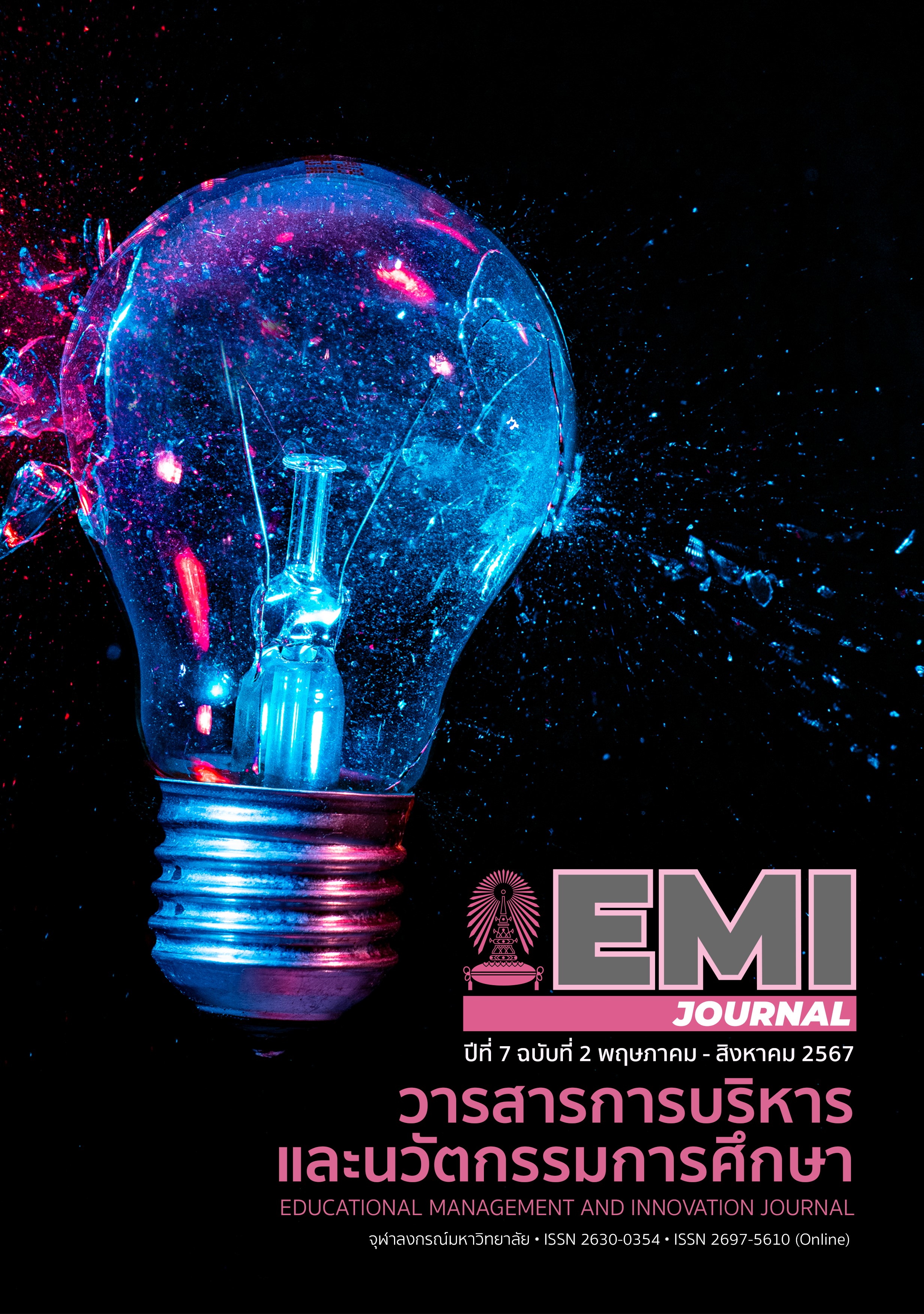Development of Neuroleadership Indicators for Private School Administrators under The Office of The Private Education Commission
การพัฒนาตัวชี้วัดภาวะผู้นำเชิงประสาทวิทยาศาสตร์ของผู้บริหารโรงเรียนเอกชน สังกัดสำนักงานคณะกรรมการส่งเสริมการศึกษาเอกชน
คำสำคัญ:
ภาวะผู้นำ, ภาวะผู้นำเชิงประสาทวิทยาศาสตร์, ผู้บริหารโรงเรียนเอกชนบทคัดย่อ
การวิจัยครั้งนี้มีวัตถุประสงค์เพื่อ 1) ศึกษากรอบแนวคิดภาวะผู้นำเชิงประสาทวิทยาศาสตร์ของผู้บริหารโรงเรียนเอกชน 2) ศึกษาองค์ประกอบและตัวชี้วัดภาวะผู้นำเชิงประสาทวิทยาศาสตร์ของผู้บริหารโรงเรียนเอกชน 3) ตรวจสอบความตรงเชิงโครงสร้างของโมเดลตัวชี้วัดภาวะผู้นำเชิงประสาทวิทยาศาสตร์ของผู้บริหารโรงเรียนเอกชน กลุ่มตัวอย่าง ได้แก่ ผู้อำนวยการโรงเรียนเอกชน ใช้การสุ่มอย่างแบบหลายขั้นตอน เครื่องมือการวิจัย ได้แก่ แบบสัมภาษณ์กึ่งโครงสร้าง แบบบันทึกการสนทนากลุ่ม และแบบสอบถาม สถิติที่ใช้ในการวิจัย ได้แก่ ค่าเฉลี่ย ค่าส่วนเบี่ยงเบนมาตรฐาน การวิเคราะห์เนื้อหาและการวิเคราะห์องค์ประกอบเชิงยืนยัน
ผลการวิจัยพบว่า 1) กรอบแนวคิดภาวะผู้นำเชิงประสาทวิทยาศาสตร์ ประกอบด้วย 5 องค์ประกอบ ได้แก่ สถานะ ความแน่นอน ความมีอิสระ ความเกี่ยวพัน และความเป็นธรรม 2) องค์ประกอบและตัวชี้วัดภาวะผู้นำเชิงประสาทวิทยาศาสตร์ ประกอบด้วย 5 องค์ประกอบ 16 ตัวชี้วัด ดังนี้ (1) ด้านสถานะ ประกอบด้วย 4 ตัวชี้วัด (2) ด้านความแน่นอน ประกอบด้วย 3 ตัวชี้วัด (3) ด้านความมีอิสระ ประกอบด้วย 3 ตัวชี้วัด (4) ด้านความเกี่ยวพัน ประกอบด้วย 3 ตัวชี้วัด (5) ด้านความเป็นธรรม ประกอบด้วย 3 ตัวชี้วัด 3) ผลการตรวจสอบเชิงยืนยัน พบว่า ตัวชี้วัดภาวะผู้นำเชิงประสาทวิทยาศาสตร์ของผู้บริหารโรงเรียนเอกชนมีความสอดคล้องกลมกลืนกับข้อมูลเชิงประจักษ์ โดยพิจารณาจากค่าดัชนีความกลมกลืน คือค่า X2 = 74.06, df = 65, p-value 0.21; Relative X2 = 1.14; GFI = .98; AGFI = .95, RMR = .01; SRMR = .01, RMSEA = .02
Downloads
เอกสารอ้างอิง
Ahmet, G. (2021). Neuroleadership: A Conceptual Analysis and Educational Implications. International Journal of Education in Mathematics Science and Technology, 9(1), 63-82.
Champajorn, A. (2018). Behaviour of School Administrators. Journal of Roi Kaensarn Academi, 3(2), 47-61.
Chantawan, A. (2017). The Influences of Job Autonomy-Openness to Experience Personality and Conscientiousness Personality-Perceived Self-Efficacy on Effectiveness of Academic Performance. Electronic Journal of Open and Distance Innovative Learning, 7(1), 104-123.
Gordon, E. (2000). Integrative Neuroscience: Bringing Together Biological, Psychological and Clinical Models of the Human Brain. Harwood Academic Publishers.
Hamlin, C. R. (2017). Neuroscientific Strategies for Managing Stress Related to Pervasive Change in Public Education. Retrieved April 23, 2022, fromhttps://ursa.mercer.edu/bitstream/handle/10898/5063 /Hamlin_mercer_1160E_10039.pdf?sequence=2&isAllowed=y
Kiartivich, S. (2018). Perception of Organizational Climate and Self-Development of Private Employees in Bangkok. Veridian E-Journal, Silpakorn University, 11(3), 208-219.
Kiartivich, S. (2019). NeuroLeadership: Applying Neuroscience to Leadership and New Public Management. Journal of Politics, Administration and Law, 13(1), 237-250.
Knezevich, S. J. (1984). Administration of Public Education (4th ed.). New York: harper and Raw.
Kwanyuen, P. (2017). The Desirable Characteristics of School Private Administrators as Attitudes by Teacher of Private School in Sattahip Chonburi. [Master’s thesis, Burapha University]. [In Thai]
Kulnanun, T. (2019). Neuroeducation: Current Human Capital Development for the Future. Karupibul Journal, 6(2), 169-183.
Leigh, A., Zwaan, R. V., & Dorrian, A. (2019). The Role of Neuroleadership in Work Engage ment.
SA Journal of Human Resource Management 17.
Makmeesab, A. (2013). Code of Ethics for School Administrator. [Doctoral dissertation, Silpakorn University]. [In Thai]
Molina Carrasco, Z. C., & Collazos Alarcon, M.A. (2021). Quality in the Management Processes of Educational Institutions from the Neuro-Leadership. Revista lberoamericana de educacion.
Patipimpakorm, P. (2007). Leadership Style and Effectiveness of Administrater of Basic Education Private Schools. [Doctoral dissertation, Silpakorn University]. [In Thai]
Phoruksa, P. (2018). Trust in Supervisor, Work Engagement, Organizational Citizenship Behavior and Job Performance of Professional Nurses in the Private Hospital. J. of Soc Sci & Hum, 44(2), 249-273.
Pope, S. N. (2019). A Systematic Literature Review of School Leadership Intelligences for the Development of Neuro-Educational Leadership. [Master’s thesis, University of New England].
Ringleb, H., & Rock, D. (2008). Chapter 1: The Emerging Field of Neuro-Leadership. pp. 1-29. In D. Rock and A. H. Ringleb (Eds.), Handbook of Neuroleadership. CreateSpace, Scotts Valley, CA.
Rongklad, W. (2016). The Relationships Among Organizational Trust, Perceived Organizational Support and Organizational Citizenship Behavior of Employees in a Beverage and Food Company. [Master’s thesis, Thammasat University]. [In Thai]
Tokuhama-Espinosa, T. (2008). The Scientifically Substantiated Art of Teaching: A Study in the Development of Standards in the New Academic Field of Neuroeducation. (Mind, Brain, and Education Science). [Doctoral dissertation, Capella University, Minnesota].
Tokuhama-Espinosa, T. (2010). Mind, Brain, and Education Science a Comprehensive Guide to the New Brain-Based Teaching. New York: W. W. Norton & Company.
Wonganutraroj, P. (2003). Academic Administration. Bangkok: Text and Journal Publication.
ดาวน์โหลด
เผยแพร่แล้ว
ฉบับ
ประเภทบทความ
สัญญาอนุญาต
ลิขสิทธิ์ (c) 2024 วารสารการบริหารและนวัตกรรมการศึกษา

อนุญาตภายใต้เงื่อนไข Creative Commons Attribution-NonCommercial-NoDerivatives 4.0 International License.



